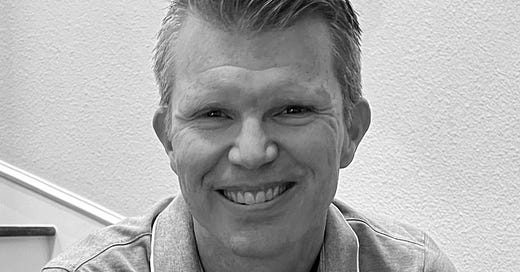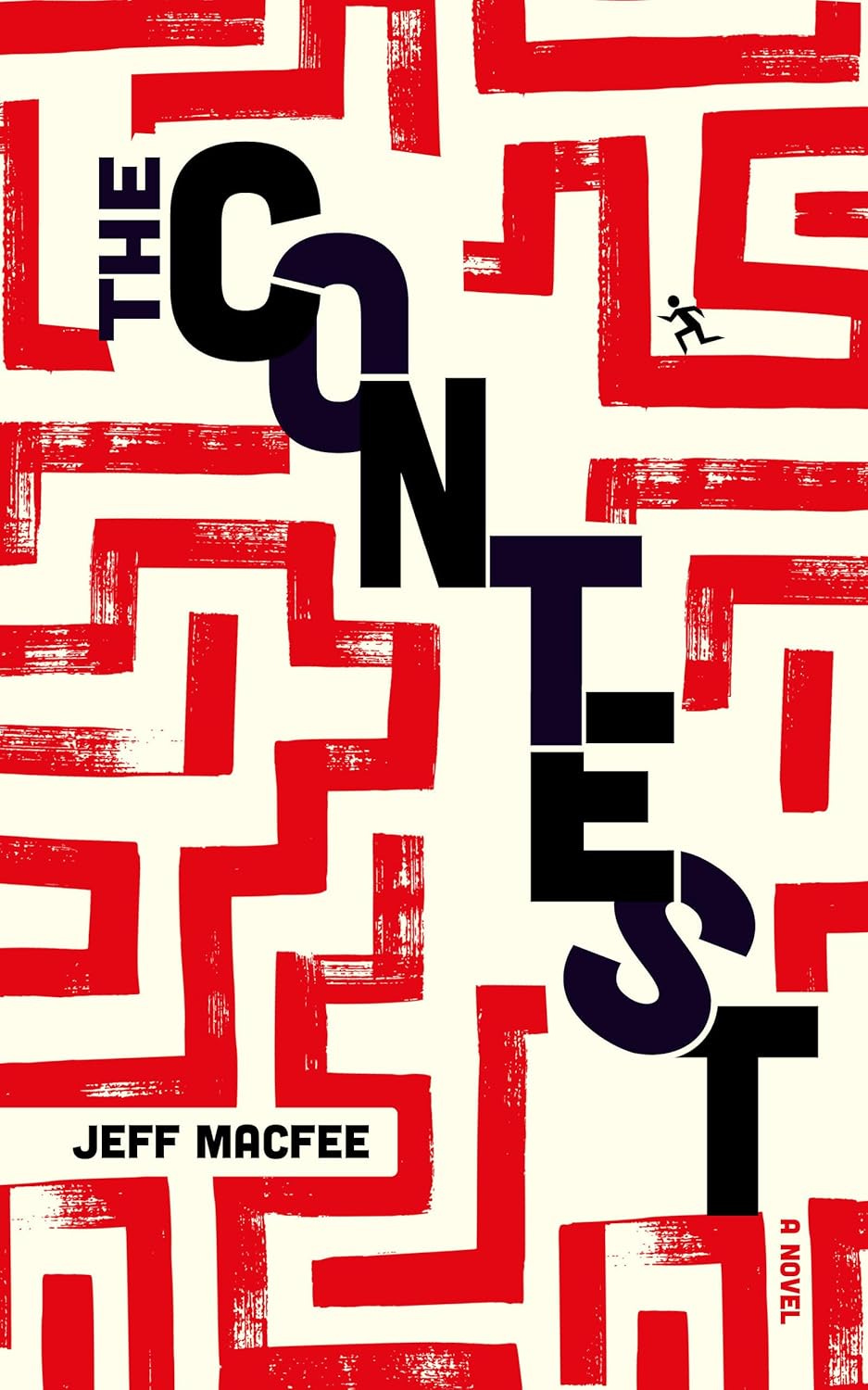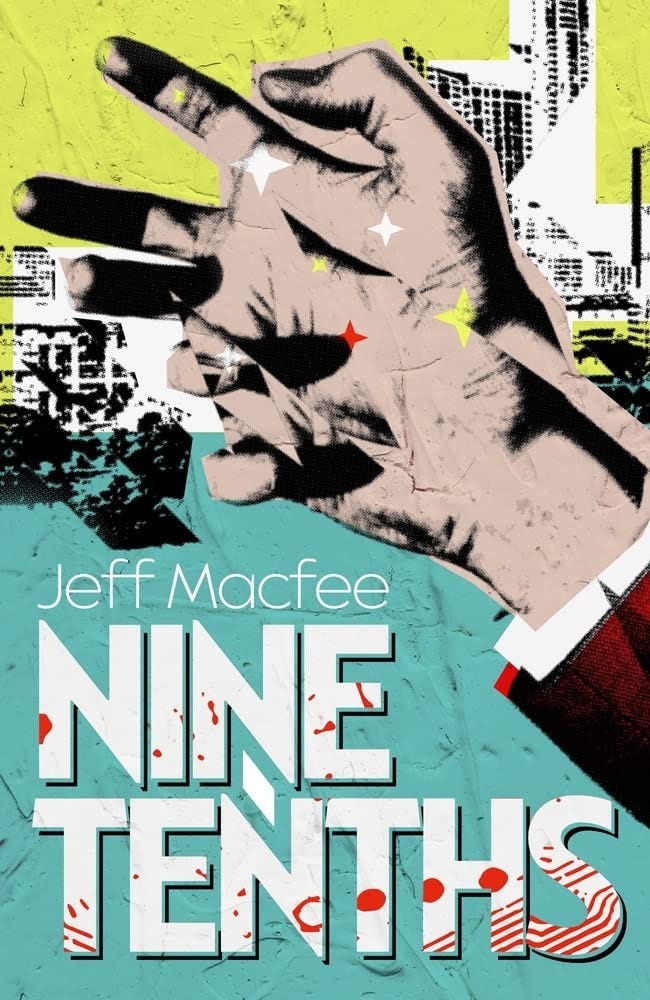When I met Jeff Macfee a few years ago, I was disappointed that he didn’t look like Dale Gribble from KING OF THE HILL. Because Dale had been Jeff’s Twitter icon as long as we’d (virtually) known one another, I half-expected him to be wearing a gimme cap and carrying a fistful of pocket sand. (#IYKYK)
With his easy smile and sneaky sense of humor, Jeff couldn’t be further from the paranoid, chain-smoking Dale. He’s also a fantastically gifted writer whose latest novel, THE CONTEST, explores issues of trauma and self-worth through a puzzle-box premise. It’s a fun and thrilling read that also holds a huge amount of heart.
Jeff’s the latest Five for Them, One for Me.
Let’s go.
FIVE FOR THEM
1. What was the origin point for your novel THE CONTEST?
I had two different ideas I mashed together. An Indiana Jones / Doctor Who type who travelled the world solving problems, and a vague concept of someone who didn’t win “the big prize” at the end. Combining one idea with the other left me with Gillian and her story. This took a more idealized character and background and made it more grounded and helped flesh out the runner-up kid with a real character. Basically, I gravitated to the idea of someone who lost when they were sure they’d win—what would that experience do to a person? How would they find their way? Also, it felt like a different enough story, this world of high-stakes problem-solving filled with real people—I thought (hoped) it would work.
2. THE CONTEST offers a balance of this high-concept world—Miscellany is described as “Disney World for puzzle lovers”—with the very real stakes of Gillian Charles struggling to afford her mother’s health care facility and her own trauma from childhood. Talk a little about those contrasting worlds, and how you found the balance between them.
Again I was interested in a more grounded protagonist. Having a main character who struggled with the real-world problem of an aging parent felt relatable and offset the otherwise fantastical nature of this life-changing contest. That said, I wasn’t trying to write the “aging parent” novel, but a story about someone who, like a lot of us, didn’t have their life turn out like they thought it might. Turning up the dial on that feeling--this contest Gillian was positive she’d win, and then didn’t--made the novel all the more interesting, at least for me. So, yes, there’s puzzles, and those parts of the novel are fun, but there’s also what I hope are genuine character moments.
3. Every puzzle solver has their own methodology in their work. What was your process, writing a mystery novel about puzzles? Did you have a detailed outline or did you jump in and build the story as you wrote?
In ye olden days, well before I wrote this book, I’d wing it. I bought into the idea that plotting out the story would kill the creativity. For me, that proved untrue. A lack of outlining just left me with no rails, and no markers to drive toward. Which meant stories that meandered and required a ton of extra work in edits. I’m a plotter now, and that approach includes the character arcs, the emotional beats, etc., etc. My agent introduced me to spreadsheets for the writing process, and for THE CONTEST I wound up with a 36-column spreadsheet of story beats and “check for this” qualities to review. It would make a pantser sweat. Of course, plenty of writers wing it all day long, so, whatever works.
4. Your previous novel, NINE-TENTHS, spun a super hero story with the PI novel; THE CONTEST twists the expectations of a puzzle box narrative. What draws you to stories that play with and usurp tropes?
I’ve always been drawn to edge characters in an otherwise traditional narrative. NINE TENTHS was a story about a normal repoman trying his best in a superpowered world. He’s surrounded by big world-saving heroes (and world-threatening villains) but he’s otherwise just this normal guy with bills to pay. Similarly, THE CONTEST is about a woman who didn’t win it all and spent years struggling with her perceived failure, surrounded by what she sees as more successful, powerful peers. This “looking from the outside in” framework struck a chord with me. Most people have felt insecure, or have met someone they, at least momentarily, envy for their success. That’s a way more relatable feeling, to me. I feel I have more to say when focusing on the person next to “the chosen one”.
5. There’s the WILLY WONKA parallels to THE CONTEST, but taking the story forward and looking at the one-time contestants as adults, and how the game affected them, builds a richness in the characters. What were some of the unexpected influences you found also contributing to writing this book?
Certainly the germ of the idea was Wonka (the film) with a twist – what if the chocolate factory tour was full of Charlie Buckets, what if they all deserved to win in their own way? There’s also easy comparisons to make with THE QUEEN’S GAMBIT in terms of a protagonist undone by competition and related pressures, although I honestly didn’t think of the book or TV series a ton during writing. To make THE CONTEST “more real” I definitely looked at the films of Sidney Lumet and more modern directors like Fincher and Scorsese. Lumet’s protagonist in THE VERDICT is a broken and beaten man when the film starts, but he wasn’t always that way. Same with Fincher’s SEVEN—Somerset is a broken man with a past suggesting a different kind of cop, maybe one who cares enough to solve one last case. Influences not so much in terms of story but more the focus on character and emotional conflict. People at least trying to rediscover a better version of themselves. So while there’s puzzle action in the book, I very much wanted to focus on the character drama.
ONE FOR ME
NPR Puzzle Master Will Shortz shows up on a random Sunday afternoon to play board or card games—your pick. Choose your three.
How dare he, I hope he was invited.
As involved as the puzzles are in THE CONTEST, I have simpler taste in games and prefer the type you can complete in an under an hour. Some of the go-tos most recently:
· Jaipur
· Sushi Go
That’s all we’ve got for now. Thanks for coming. See you next time, and hey, let’s be careful out there.






